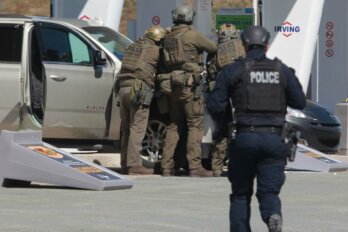This is the third instalment in a series about a criminal rape trial that took place in Toronto late last year. The trial lasted eight days; the judge announced his verdict earlier this month.
At the time of the actions that led to the criminal charges, the female accuser was seventeen years old, entering her final year of study at a Toronto high school. The male defendant was a year older, a star athlete on his way to winning a scholarship to a US college. She had substantial credibility problems on the witness stand. His testimony seemed far more convincing—at least at first. But this was more than just a “she said, he said”—or, as it turned out, “she lied, he lied”—case. There was an element of physical evidence against him: bruises on her arms and legs. The judge had to decide if the totality of the prosecutors’ case against the defendant was enough to send him to jail, brand him a sexual offender, and destroy his promising future.
Despite its sensational nature, this was a case that never made headlines. What I observed during my reporting was the farthest thing from a Jian Ghomeshi courthouse scene, with mobs of press and police. I was the sole reporter at the superior court trial and, on most days, the only observer not directly related to the case. The mother and grandmother of the accused, whom I will call Matthew in the reports that follow, attended throughout the trial. The complainant, who will be known as Ava, was supported by a representative from victim services and the detective in charge of her case.
Ava’s family and Matthew’s father were not permitted in the courtroom as they were all considered to be potential witnesses. They spent much of their time in the courthouse hallways, pacing or sitting nervously. Like everyone else, they knew that the events unfolding on the other side of the courtroom door would deeply affect the two young people involved for their entire lives.
—Ann Brocklehurst
It’s a Friday in Toronto, the fourth day of the trial. The presiding judge, Ontario Superior Court Justice Gary Trotter, ruled earlier in the week—in a non-public session known as a “276 application”—that certain prior sexual acts performed by the accused, Matthew, and the complainant, Ava, will be admissible.
This trial is proceeding far more slowly than most. During the past two days of testimony, the judge has granted frequent breaks so that Ava—who is now nineteen years old, and has been distraught on the witness stand—can collect herself. Gary Stortini, one of two lawyers defending Matthew, has not yet finished cross-examining her. And this morning, she is half an hour late for court.
When Ava finally arrives, Stortini jumps back into his questions. He asks about several consensual encounters, all from the summer of 2012, that she admits to having with his client.
“How many times? ” he asks.
“Three or four,” she says.
“Always in your bedroom? ”
“Yes.”
“What time of day? Who was home? ”
“Nobody was home. I made sure of that. It was always during the day, not night. I was not hiding anything. I just did not feel comfortable with my parents in the house.”
Stortini presses Ava about the first time that she and Matthew, who is a year older than her, had sex.
“Who was home? Your mother? ”
“Yes. She’s always home, always on the computer working,” she says. “He wanted to show me videos of how he played [sports].”
“But your mother was home.”
“Yeah, we did it anyways.”
Ava ignores this contradiction—that in minutes, she has gone from protesting that she wouldn’t have sex when a parent was home to admitting that she had.
Stortini focuses on a particular week from that July, when his client had a week off from his summer job. According to the defence attorney, that’s when the couple had sex on four consecutive dates.
On the first day, Matthew and Ava headed out for dinner at a sports bar after having intercourse. On the second day, he was invited to eat at her house, then she drove him home. On the third day, she asked him to take her to her wisdom tooth extraction. He said he couldn’t, but stopped by her house later in the evening.
“Even though you had your surgery, you still got close,” says Stortini.
“That never happened. My face was the size of a tennis ball,” says Ava.
“You may not have kissed, but you had sex.”
“No,” she cries, covering her face.
Stortini asks if she and Matthew had sex on the fourth day.
“No. I was on medicine, painkillers,” she says, rolling her eyes.
“Did you have feelings for him? ”
“Yeah, he was nice.”
“A lot? ”
“No, I’d only known him for a month.”
At the end of the week in question, Stortini points out, his client travelled to the US for a sports tournament. Matthew and Ava didn’t see each other again until early August—the night of the alleged rape.
“When he left [for his tournament], you thought you’d have contact? ”
“Can you rephrase the question? ”
This is a response Ava gives frequently; many times, she tells Stortini she cannot understand his questions, and asks him to repeat himself. Both counsel and witness are often exasperated with each other, to the point that the judge has to intervene on several occasions during the cross-examination.
“Did you think you would be seeing him again? ”
“I assume. We didn’t plan anything. Just go with the flow.”
“Did you miss him? ”
“No. He wasn’t gone for a year. I assumed I was going to see him.”
“That weekend, he told you to give him some space, that it was a very serious tournament with lots of scouts. Do you recall? ”
“No, I don’t. I said, ‘Have a good trip, good luck, be safe.’ I wasn’t hounding him.”
“He had stopped texting you back,” says Stortini, as Ava sighs and rolls her eyes again.
“He didn’t indicate, ‘Leave me alone,’” she says. “I just assumed it was the long-distance charges. I wasn’t sitting around waiting, expecting to hear from him. I wasn’t expecting anything.”
Stortini says that when Matthew returned from the trip, he never contacted Ava. She eventually got in touch to invite him to her birthday dinner.
“I didn’t want to hound him, or be—” says Ava, before she turns and speaks to Justice Trotter.
“She was smiling and looking up,” I hear Ava say to the judge. She’s complaining that someone in the audience is making faces—a forbidden practice in court, where proper decorum is strictly enforced. Since I have been looking at her, noting her mannerisms and expressions as I make notes, I’m worried that, through some inadvertent action on my part, I am the one being reported. After all, the only other women it could be are Matthew’s mother, his grandmother, and a victim services support worker.
As distressed as Ava has appeared at times, she also has a feisty and combative streak. When she’s not in tears, she doesn’t hesitate to snap at Stortini: for example, she’s told him he is clueless about things like how BBM and Facebook work. Now she is reporting someone for making a face, when she herself rolls her eyes and makes faces.
“It was the girl with black hair,” she tells the judge.
Although I’m a brunette, I feel a wave of relief. She means Matthew’s mother, whose hair is a few shades darker than mine.
Trotter takes the situation in stride, telling the accused’s family they haven’t done anything wrong, and have a right to be here—but in a small courtroom, he explains, witnesses pick up on the expressions of audience members. There are no admonitions. He just tells us all to be conscious of the situation, then calls another recess.
I get the distinct impression that Ava is displeased by this measured reaction. When she fails to return at the end of the twenty-minute break, the defence team is unhappy. Back in the courtroom, I overhear Stortini’s co-counsel, Carolyne Kerr, mutter, “She’s holding us all hostage.”
Sharna Reid, the prosecutor, says she has tried unsuccessfully to approach Ava, who is huddled in the hallway with Detective Brian Wookey, the Toronto Police Service officer in charge of the case. “I don’t believe she can continue with the cross-examination,” Reid tells Trotter. “It’s very difficult to have questions answered as to what exactly the issue is.”
The judge is perplexed as to what triggered the breakdown, as is Stortini. “I agree you’ve acted professionally,” says Trotter. “I can see how anybody would be upset dealing with these personal matters.”
The defence, the Crown, and the judge agree that the questions are only going to get harder. Trotter wonders if he should bring in another judge to make a procedural ruling. This is a trial by judge alone, so he doesn’t have to worry about a jury, but he must consider whether any action he takes could taint his neutrality.
“Is this case going to go ahead or not? ” he asks Reid.
“If the complainant can, we will go ahead,” she says. “Without the complainant, the prosecution will come to an end.”
It is now noon, and there has only been a half hour of testimony all morning.
“We’ll come back at 2:30,” says Trotter. “I think a decision does need to be made.”
As we break for lunch, I’m betting the trial won’t resume. But when I return to the courthouse, Ava and her family are all waiting in the hallways. Their presence seems to invigorate her. Back on the stand, as Stortini picks up his cross, she is in scrappy mode again.
The defence lawyer suggests that the accused had made it clear he no longer wanted to see her.
“No,” she says.
“No? ”
“No.”
Stortini asks Ava to explain when she invited Matthew to her birthday.
“I invited him the night before. . . . He said he was at work and he’ll let me know.”
“He wasn’t getting back to you, and you still wanted to see him.”
“That’s incorrect, because I wanted a friend to be at my birthday party and I invited him.”
Stortini asks her who else was invited. He establishes that Matthew was the only potential guest apart from a girlfriend of Ava’s and her date.
“My birthday is midsummer, so a lot of people couldn’t come,” says Ava.
In the end, Matthew didn’t show up.
“You were embarrassed, humiliated, upset,” says Stortini.
“No, because it happened once before,” says Ava, referring to the time when Matthew had stood her up to watch fireworks on Canada Day. “I just wanted to enjoy my birthday. I didn’t think twice.”
“You messaged that night that you never wanted to see him again,” says Stortini.
“No, because we weren’t fully established. At this point . . . he was brushing me off. I was brushing him off.”
“How were you brushing him off? ”
“In my own mind. Whatever.”
Next, Stortini brings up Ava’s videotaped police statement—submitted as evidence earlier in the trial—in which she discussed a series of text messages made several days after her birthday. She told police that Matthew had sent her a hey-how-r-u? kind of message that she basically ignored.
But Stortini says it was actually Ava who initiated the contact, by phoning to tell Matthew that her father was in hospital for a medical emergency. She completely denies anything of the sort, saying Matthew had been looking for marijuana for a friend.
Stortini does a double take, wondering why he’s never heard this story before: Ava didn’t mention it to the police or at the preliminary inquiry.
“I never wanted this, so I’m sorry I missed one thing,” she says, raising her voice. “Because of what had been done to me, how my body was.”
The lawyer shifts gears. He asks the witness if she is aware that her friend Zoe gave her own police statement about what happened on the night of the alleged rape. Ava nods.
Stortini explains that Zoe’s statement contradicts Ava’s. Zoe told police that Ava had brought a mickey of Bacardi rum to her house, and that they drank it on the subway as they headed downtown to a concert at Dundas Square.
Ava, however, told Wookey that she’d only drank half that much at Zoe’s house, and never mentioned that she had supplied the bottle. Ava also said a third friend was present, although Zoe said they’d met up with him at the subway station.
Moving along, Stortini says Ava phoned Matthew before going to the concert. She denies it. The defence has subpoenaed her phone records; he shows them to her, pointing out a call she made at 6:50 that evening. Ava shakes her head and mouths something at her current boyfriend, who is sitting in the courtroom.
Stortini shifts his focus to a series of text messages sent earlier that day, during the afternoon. Ava’s police statement indicated that there had been approximately twenty texts, and they were mostly about getting back some of her belongings from Matthew. His lawyer wants to know what exactly his client had of hers.
“He had my underwear and my shirt.”
“Why did he have your underwear? ”
“He took them from my house.”
“He took them from your house? ” Stortini is clearly surprised by this revelation. At the preliminary hearing, she did not explain how Matthew came to have her panties.
“I suggest the reason he had your underwear was you left them in his car,” says Stortini, referencing a sexual encounter that he has already questioned her about—and which she insisted never took place.
Ava says absolutely not: Matthew had asked for them when he was in her bedroom. “He liked them. He said they were cute.”
“If you were giving [them] to him, why would you want [them] back? Wasn’t it a gift? ”
“I felt uncomfortable with him having them in his possession.”
Stortini asks about the shirt that Ava had wanted Matthew to return. She replies it was just a shirt. Stortini says it was, in fact, one of Matthew’s sports shirts that he had lent to her.
“I never had any of his clothing,” she says.
Stortini disagrees. What actually happened, he suggests, is that Matthew told Ava he couldn’t meet her to return it that day because he was busy.
“Well, so was I,” she says. “I don’t recall the conversation.”
In her police statement, Ava says her first call to Matthew happened twenty minutes after midnight—she asked him for a lift home after she had already phoned three other friends. But Stortini again points to her phone records, which show an outgoing call to Matthew at 10:58 pm. There are no prior calls to other numbers.
“[Matthew] said, ‘Try someone else. If you can’t find anyone, I’ll take you,’” the lawyer says to the complainant. “It was [Matthew] who suggested you call other people . . . You never called three other people before you tried to call [him].”
“I just wanted to get home,” Ava says.
[on-trial]



